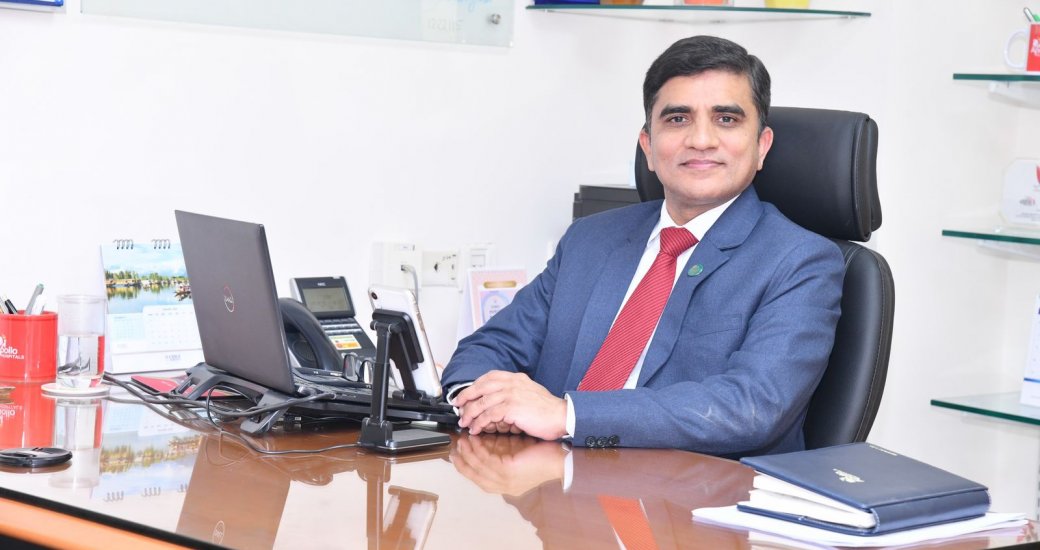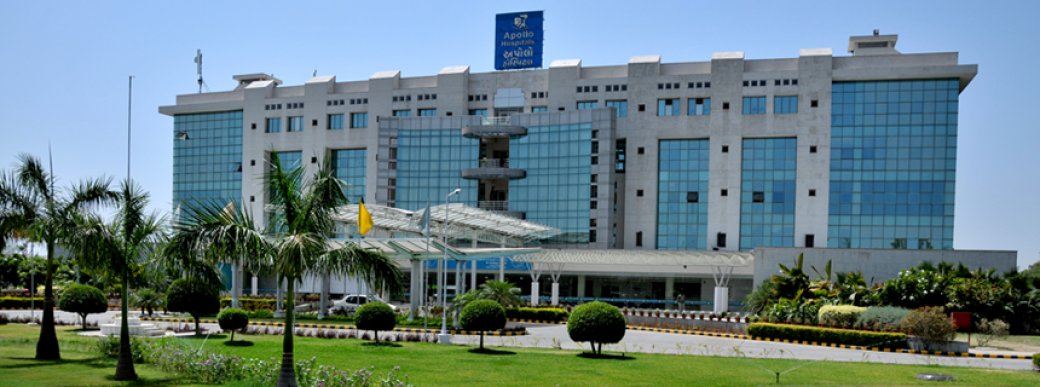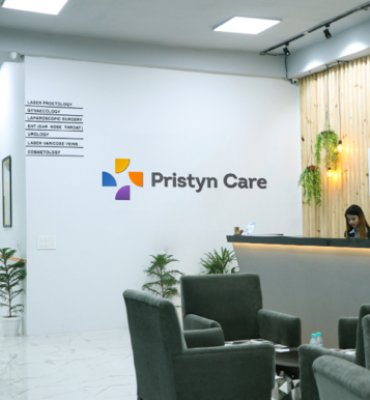
Mr. Neeraj Lal, the COO of Apollo Hospitals, Ahmedabad, Discusses Technological Advancements and Future Trends in Healthcare.
In a recent exclusive interview with Rimjhim Singh, Editor, of The Gray Matter, Mr Neeraj Lal, the Chief Operating Officer (COO) of Apollo Hospitals, Ahmedabad, delved into the innovative technological advancements that have been revolutionizing hospital operations and elevating patient care to new heights.

Mr. Neeraj Lal in conversation with the Editor and Co-founder of The Gray Matter, Rimjhim Singh
1.What key technological advancements have Apollo Hospitals Ahmedabad implemented to enhance hospital operations and patient care?
Apollo Hospitals Ahmedabad has adopted several innovative technologies to improve both operational efficiency and patient experience. For instance, we have introduced an "Uberization" of transport services within the hospital to streamline patient transfers, significantly reducing waiting times and enhancing the overall experience. Patient transfers, especially from wards to ICUs or operating theaters, have been a significant issue in hospital operations. To address this, Apollo Hospitals has introduced a dedicated app that connects healthcare staff with a patient transport team, reducing waiting times to a minimum and ensuring a seamless transfer experience.
We have also transitioned to ePrescriptions for outpatient care, with around 70% of our doctors utilizing this technology. This allows doctors to spend more time with patients, as prescriptions are automatically generated based on voice recordings and specialized templates. The result: streamlined procedures and efficient tracking of prescribed medications and procedures.
The introduction of smart rooms has redefined the patient experience. Patients and their families can now control various aspects of their environment, such as lighting, curtains, and entertainment systems, through voice commands. This innovation is particularly beneficial for pediatric patients, keeping them engaged during what can be challenging waiting times.
Apollo Hospitals has revamped the discharge process to cater to different patient types. For corporate clients, dedicated help desks and relationship managers ensure quick billing and discharge. For TPA and insurance patients, discharge coordinators on the floor expedite the process. Even cash patients benefit from a streamlined discharge, with a target time of less than 45 minutes.
In response to the post-pandemic era, Apollo Hospitals has leveraged telemedicine and remote monitoring to improve patient access to healthcare services. Partnerships with platforms like Apollo Connected Care have allowed for remote management of critical care patients across vast geographic areas. These technologies utilize AI and machine learning to monitor vital signs and provide timely care.

2.You mentioned that while technology brings numerous benefits, there can be challenges as well. Could you share any instances where technology had unexpected drawbacks or challenges in healthcare?
While technology is a powerful tool, it can occasionally present challenges. For instance, in the context of e-prescriptions, where voice recordings are transcribed into prescriptions, there may be instances where terminology or context can lead to confusion. To mitigate this, we have a validation process in place. Every prescription generated through this software requires a doctor's signature, and these prescriptions are cross-checked and validated when handed over to the patient. This ensures that potential misunderstandings or inaccuracies are addressed before the patient receives their prescription. Transitioning from manual to digital processes can have its share of challenges, but it's crucial to implement checks and balances to ensure the highest level of accuracy and patient safety.
Adapting to the evolving landscape of healthcare technology is essential. At Apollo Hospitals Ahmedabad, we actively work to address challenges by providing support and training to healthcare professionals. For instance, some doctors may still prefer manual methods over digital ones. In such cases, we offer support in the form of physician assistants or medical officers to help them transition to ePrescriptions and other digital practices.
3.How does Apollo Hospitals Ahmedabad address the cybersecurity concerns associated with the increasing digitization of healthcare?
Ensuring the security of patient data is a top priority for us. To address the growing cybersecurity challenges, we conduct annual cybersecurity audits and employ AI-enabled antivirus software to safeguard patient data. Our IT infrastructure is distributed across multiple locations, adding an extra layer of security. These measures are essential in safeguarding sensitive patient information in an era of rising cyber threats.
4.Can you shed light on the integration of emerging technologies like Artificial Intelligence, Machine Learning, and the Internet of Things (IoT) into patient care at Apollo Hospitals Ahmedabad?
The integration of emerging technologies is an exciting development at Apollo Hospitals Ahmedabad. For example, we have initiated the Apollo Connected Care program, which leverages technologies like AI and machine learning for remote management of critical care patients across a wide geographic area. These technologies help monitor vital signs and provide timely care. This represents the future of healthcare, where efficiency, accessibility, and patient-centric care are at the forefront of our efforts.
5.What key performance indicators (KPIs) does Apollo Hospitals Ahmedabad use to measure the efficiency of its technology-driven initiatives?
We utilize a range of KPIs to gauge the effectiveness of our technology-driven initiatives. These include operational excellence scores, quality service excellence scores, and mystery audits. These metrics help us continually assess and enhance the efficiency of our initiatives, ensuring that we maintain the highest standards of patient care.
6.Apollo Hospitals Ahmedabad has mentioned providing home healthcare services. Could you shed some light on these services and how they benefit patients?
Certainly. Home healthcare services have become increasingly vital, especially for patients who may not be able to visit the hospital for follow-ups or require ongoing care in the comfort of their homes. Under the brand "Apollo Home Health Care," we offer a range of services to our discharged patients. These services include physiotherapy, pharmacy support, and regular check-ins by paramedics or nurses. By providing these services at home, we ensure that patients receive the necessary care and support even after leaving the hospital. This is particularly beneficial for elderly patients and those with mobility issues who find it challenging to make frequent hospital visits. A notable example is the Apollo Pro Health campaign, where we offer health checkups to patients in the comfort of their homes. Phlebotomists visit patients' homes in the morning to collect fasting blood samples. Subsequently, the samples are processed, and the results are communicated to patients. This not only saves patients the hassle of visiting a hospital for routine checkups but also encourages proactive health monitoring. It's a testament to our commitment to making healthcare more accessible and patient-friendly.
7.In closing, do you have any advice for healthcare leaders looking to leverage technology to enhance patient care and hospital operations?
I would like to emphasize that technology is the future of healthcare. Healthcare leaders should invest in technology to enhance patient experiences, improve clinical outcomes, and build successful healthcare businesses. By focusing on technology-driven initiatives and creating exceptional moments for patients, we can elevate patient satisfaction indexes across the industry. Remember, hospitals are not just about healthcare; they're about hospitality as well. Creating a positive patient experience is paramount.










